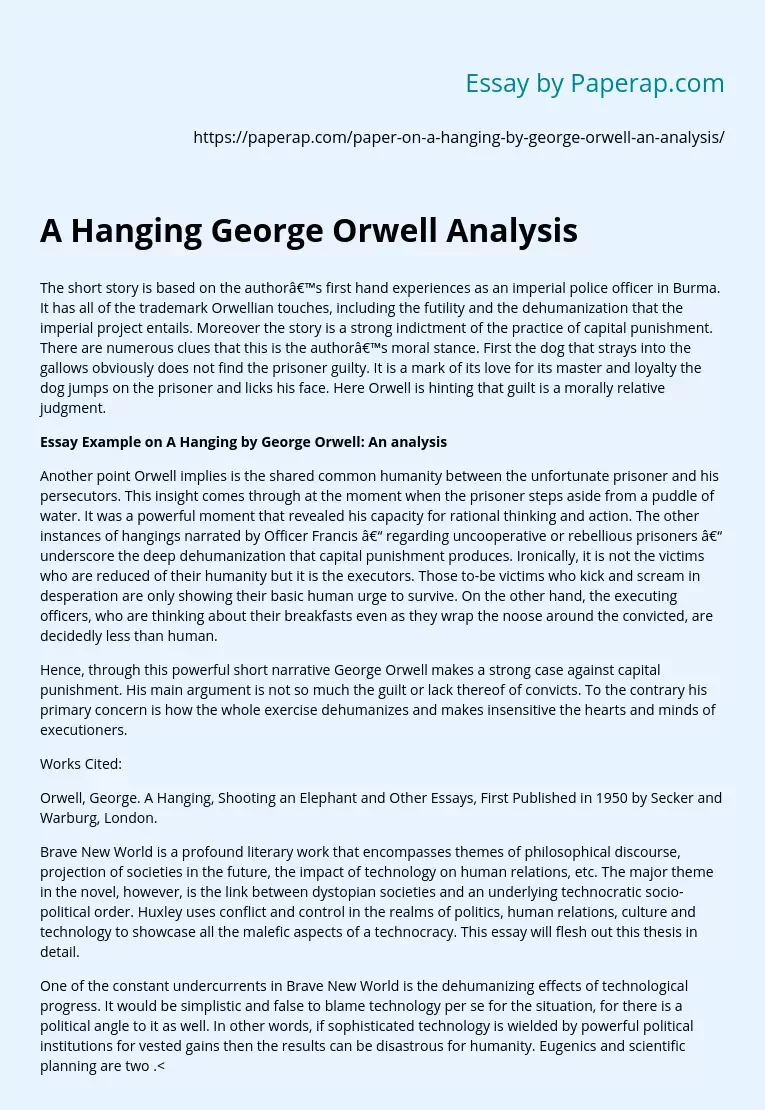A Hanging George Orwell Analysis
The short story is based on the author’s first hand experiences as an imperial police officer in Burma. It has all of the trademark Orwellian touches, including the futility and the dehumanization that the imperial project entails. Moreover the story is a strong indictment of the practice of capital punishment. There are numerous clues that this is the author’s moral stance. First the dog that strays into the gallows obviously does not find the prisoner guilty. It is a mark of its love for its master and loyalty the dog jumps on the prisoner and licks his face.
Here Orwell is hinting that guilt is a morally relative judgment.
Essay Example on A Hanging by George Orwell: An analysis
Another point Orwell implies is the shared common humanity between the unfortunate prisoner and his persecutors. This insight comes through at the moment when the prisoner steps aside from a puddle of water. It was a powerful moment that revealed his capacity for rational thinking and action.
The other instances of hangings narrated by Officer Francis – regarding uncooperative or rebellious prisoners – underscore the deep dehumanization that capital punishment produces. Ironically, it is not the victims who are reduced of their humanity but it is the executors. Those to-be victims who kick and scream in desperation are only showing their basic human urge to survive. On the other hand, the executing officers, who are thinking about their breakfasts even as they wrap the noose around the convicted, are decidedly less than human.
Hence, through this powerful short narrative George Orwell makes a strong case against capital punishment. His main argument is not so much the guilt or lack thereof of convicts. To the contrary his primary concern is how the whole exercise dehumanizes and makes insensitive the hearts and minds of executioners.
Works Cited:
Orwell, George. A Hanging, Shooting an Elephant and Other Essays, First Published in 1950 by Secker and Warburg, London.
Brave New World is a profound literary work that encompasses themes of philosophical discourse, projection of societies in the future, the impact of technology on human relations, etc. The major theme in the novel, however, is the link between dystopian societies and an underlying technocratic socio-political order. Huxley uses conflict and control in the realms of politics, human relations, culture and technology to showcase all the malefic aspects of a technocracy. This essay will flesh out this thesis in detail.
One of the constant undercurrents in Brave New World is the dehumanizing effects of technological progress. It would be simplistic and false to blame technology per se for the situation, for there is a political angle to it as well. In other words, if sophisticated technology is wielded by powerful political institutions for vested gains then the results can be disastrous for humanity. Eugenics and scientific planning are two .
A Hanging George Orwell Analysis. (2019, Nov 27). Retrieved from https://paperap.com/paper-on-a-hanging-by-george-orwell-an-analysis/

